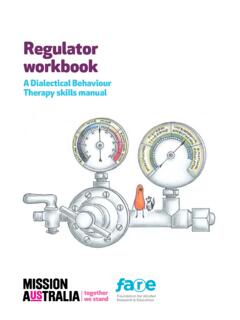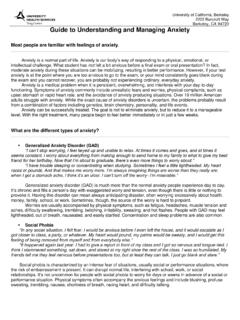Transcription of What is Borderline Personality Disorder?
1 V1 20/11/2017 What is Borderline Personality Disorder? Borderline Personality disorder (BPD) is a term used to describe a pattern of traits including strong intolerable emotions, unstable relationships with other people, issues with self-image, and impulsive behaviours. These behaviours usually start in adolescence or early adulthood and affect most areas of life, including relationships, study, and work. Changing emotions and strong, overwhelming feelings People with BPD experience difficulties in managing their emotions and communicating these feelings to other people. Often these emotions are described as very intense, out of control, and changing suddenly.
2 Sometimes they can seem to come out of the blue and it can be hard to return to a calmer state. This is distressing for both the individual and the people around them. It can be hard to manage these intense emotions, which may lead people to hurt themselves or others as a way to cope with overwhelming feelings. Relationship difficulties People with BPD describe difficulties in their relationships with other people and can often be very sensitive to signs of rejection and criticism, due to a fear of people leaving or abandoning them. This can lead to intense and stormy relationships, relying heavily on another person, not wanting to be alone, and being convinced the person may leave them.
3 This fear of abandonment may cause the person to act in ways that they think will make the person stay. It may also seem like the person with BPD changes feelings very quickly. This can lead to high levels of stress in the relationship. Problems with identity and sense of self One challenge for people with BPD can be problems with their identity. This can involve not knowing who they really are, abruptly shifting values or goals, and sudden changes in friends. People also describe feeling empty or hollow inside at times, feeling paranoid, and sometimes they may also feel like nothing is real and they are living in a dream.
4 Impulsive and self-destructive behaviours People with BPD can often act impulsively acting without thinking through the consequences of their behaviours. This can involve drug and alcohol use, binge eating, gambling, reckless driving, or risky sexual behaviour. Deliberate self-harm or suicide attempts may also be a reaction to try and manage the intense feelings experienced. Although these behaviours may provide some relief in the short-term, in the long-term they may have serious negative consequences. How common are these problems and why do they develop? It is estimated that around of the population experiences Personality disorder problems, with a smaller number experiencing BPD.
5 Although the direct cause of BPD is unknown, there are several contributing factors: - Biological or genetic factors (inherited from family) - including being emotionally and interpersonally sensitive - Traumatic early life experiences ( , abuse, neglect, death of parents, peer-victimisation, feeling invalidated by others) - Ways of thinking and coping with feelings often learnt during childhood and through experiences with other people - Stressful social circumstances financial, work, relationship, or family Can it be treated? Yes, specialist psychological treatments provided by mental health professionals have been shown to be effective in reducing symptoms and improving life functioning.
6 It is important to take active steps to get help and make changes. Support for family and partners may also be important. For treatment and support contact your local health services.


















